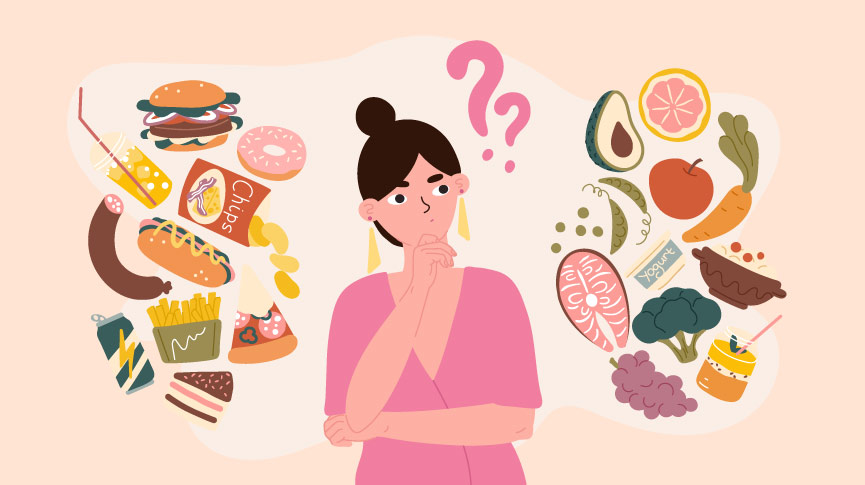Eating During Labor: What to Eat and When to Avoid It

Pregnancy is a huge, life-changing event, that comes with all sorts of questions – and it’s only the start of your journey!
Birth can be full of unexpected twists and turns, but it can still be a game-changer to prepare yourself for labor.
One of the ways people prepare for labor is by packing a hospital bag with snacks, or for home births, stocking their fridge and pantry with easy things to munch on during labor.
If you’re thinking “But I thought you weren’t allowed to eat during labor!”, we hear you.
Let’s get to the bottom of this common misconception, and discuss if it’s ok to eat during labor, the benefits of it, when you may want to avoid it, and what to eat.
Is it OK to Eat During Labor?
The idea that birthing people should avoid eating during labor was established in the mid-1900s.
Doctors found a trend of an increased risk of aspiration for birthing people who are put under general anaesthesia. Aspiration is when food or liquid is inhaled into the lungs, which can cause an inflammatory response, and is potentially fatal.
General anesthesia during birth is used less and less these days, with more people turning towards the natural route and forgoing pharmaceuticals, or using regional anesthesia like epidurals and spinal blocks.
While more and more providers are relaxing their regulations around eating during labor, this is mainly for people whose pregnancies are considered “low risk”.
There are certain times where a provider may make it explicitly clear not to eat once labor starts. This may include people who have high-risk pregnancies with eclampsia or preeclampsia or people who are using opioids for pain management.
Another reason you may be asked not to eat is if the goal is to have a planned cesarean, or if you are at high risk of needing a c-section, like someone who is pregnant with multiples, or who is trying for a VBAC (vaginal birth after cesarean).
In most cases, not only is it ok to eat during labor, but there can also be benefits to it.
Benefits to Eating During Labor
Labor is a marathon, not a sprint, and it’s called “labor” for a reason.
Would you go through one of the most physically demanding processes a human can go through without refueling? Most likely not.
Research suggests that the energy and caloric demands of someone in labor are similar to someone who is quite literally, running a marathon.
Without proper nutrition, a birthing person’s body turns to their fat as an energy source. This can potentially reduce uterine contractions by increasing baby and parent’s blood acidity. There’s a chance this could lead to longer labors and lower health scores for the newborn. Not only that, the emotional stress of fasting could possibly move blood away from the placenta and uterus, blood that is necessary for a healthy labor and baby.
That being said, many people lose their appetite during labor, especially during active labor. Between the rush of hormones and intense sensations, you might not want to eat, and that’s ok. It’s not uncommon to experience nausea or vomiting when in labor, which can limit your appetite.
Even if you don’t have an appetite, the most important thing is to stay hydrated – more on that later!
Hospital Guidelines
Although the data generally supports eating during labor for low-risk pregnancies, it still may depend on your hospital’s policies and the belief system of your provider.
As a doula, I work with my clients to increase their ability to self-advocate and make the right decisions around their reproductive health care. Not every hospital policy always has their patient’s best interests at heart, and sometimes providers have their hands tied when it comes to liability.
If you’re birthing outside of the home, it’s important when choosing a provider to ask them about their policy on eating during labor. If you want to have the option to eat, try to find a provider who supports this.
Of course, this isn’t always possible, however, you still have bodily autonomy. If your provider doesn’t support eating during labor, but it’s otherwise safe for you to do so, follow your gut (literally), but be honest with them if you do eat.
What to Eat During Labor
Again, you may not want to eat during labor. Whether you’re at home, a birth center, or in the hospital, your best bet is soft foods and liquids that are hydrating and easy to eat.
Try stocking up on nourishing broths, applesauce, squeezable baby food packets, bananas, and popsicles. If you’re at home, you can make your own popsicles with fresh juice or by freezing a superfood smoothie.
When it comes to staying hydrated, water is great, but you may also want to try coconut water, or stash away some single portion electrolyte powders to put in water.
Here’s another tip from a doula: When getting together your birth supplies, get some plastic bendy straws so that the straw can easily be brought to your mouth by your support team without you having to move.
When it comes down to it, whether or not to eat during labor depends on not only the person but that specific pregnancy. The biggest piece of advice we can give is to listen to your body and your intuition.

Natasha (she/her) is a full-spectrum doula and health+wellness copywriter. Her work focuses on deconstructing the shame, stigma, and barriers people carry around birth, sex, health, and beyond, to help people navigate through their lives with more education and empowerment. You can connect with Natasha on IG @natasha.s.weiss.


